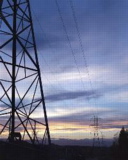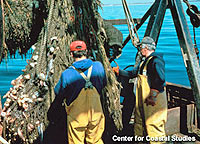
News |
- Fisher Bay and Birch Island Review
- Oil & Gas Subsidy Investigation Demanded
- Top Predator Loss - Ecosystem Effects
- Good Economics to Reduce GHG Emissions
- Manitoba Fails Annual Protected Areas Assessment
- New Indian Band Solution to Hydro Woes?
- Government Unable To Sustain Environmental Initiatives
- Tahltan Elders Arrested
- Oil Company Boss In Touch With the Times?
- Sacred Stones Or Cottages Lots?
- Russian Trawlers Over Fishing
- Critics Warn of Disastrous River Linking Plan in India
| Fisher Bay and Birch Island Review | 13 October 05 |
 Manitoba's Park Branch is inviting Manitobans to voice their opinions about the proposal to extend interim protection for a further five years for two park reserves - Fisher Bay and Birch Island. Both were nominated to be protected land by First Nation communities. The Parks Act regulation is running down. Manitoba's Park Branch is inviting Manitobans to voice their opinions about the proposal to extend interim protection for a further five years for two park reserves - Fisher Bay and Birch Island. Both were nominated to be protected land by First Nation communities. The Parks Act regulation is running down.The 79,000 ha Birch Island Park Reserve is on Lake Winnipegosis about 150 kilometres north of Dauphin. Fisher Bay Park Reserve is over 89,000 hectares in size, and has 29,000 hectares of land in protected status (the remainder being waters of Lake Winnipeg). The park reserve is located on the Northwest side of Lake Winnipeg about 200 kilometres north of Winnipeg. Manitoba Wildlands encourages members of the public to voice their support for this extension and for permanent protection of these lands. Visit the Parks Branch web site for information about the Fisher Bay and Birch Island park reserves and view the consultation letters Sources: Government of Manitoba |
|
| Oil & Gas Subsidy Investigation Demanded | 13 October 05 |
 A coalition of national environmental organizations and the former Chair of Parliament's environment committee have filed a petition with the Auditor General of Canada demanding an investigation into billions of dollars of federal subsidies to the oil and gas industry. A coalition of national environmental organizations and the former Chair of Parliament's environment committee have filed a petition with the Auditor General of Canada demanding an investigation into billions of dollars of federal subsidies to the oil and gas industry.The petition, filed October 3, 2005, highlights federal tax breaks and other subsidies that promote one of the country's largest sources of greenhouse gas (GHG) pollution and cancel out spending on Canada's effort to meet its emission reduction target under the Kyoto Protocol. Sierra Legal Defence Fund filed the petition on behalf of Friends of the Earth Canada, Pembina Institute, and Charles Caccia. Estimated federal tax subsidies to the oil and gas sector are $1.4 billion per year, based on the latest available data. Most of the subsidies are in the form of tax breaks under Canada's Income Tax Act. In the period, 1996 to 2002 these tax subsidies amounted to a staggering $8 billion. Between 1990 and 2003 Canada's GHG emissions increased by 24%, with a significant part of the increase attributable to the oil and gas industry. View the full October 3, 2005 Friends of the Earth Canada/ Sierra Legal Defence Fund/ Pembina Institute press release View the October 3, 2005 Sierra Legal Defence Fund media release Source: Friends of the Earth Canada |
|
| Top Predator Loss - Ecosystem Effects | 11 October 05 |
 Although scientists have long noted that the loss of even one species can have profound effects, a new report is one of the first large-scale studies to show clearly the widespread consequences of losing a predator at the top of the food chain. Although scientists have long noted that the loss of even one species can have profound effects, a new report is one of the first large-scale studies to show clearly the widespread consequences of losing a predator at the top of the food chain.Mark Hebblewhite of the University of Alberta, and colleagues studied what happened in "a serendipitous natural experiment" when wolves returned to part of the Bow Valley of Banff National Park in Alberta. The wolves clearly had a major effect on elk. Elk populations were 10 times as high in areas where there were no wolves, Hebblewhite's team found. However, the study also found that the effects of the re-establishment of wolves extended to flora and fauna such as willow trees, river-loving birds called willow warblers and American redstarts, and beavers. View the full August 2, 2005 Reuters article on Planet Ark Sources: Reuters/Planet Ark |
|
| Good Economics to Reduce GHG Emissions | 11 October 05 |
 Cutting greenhouse gas emissions has been good business for BP and will save the oil major about $650 million. Cutting greenhouse gas emissions has been good business for BP and will save the oil major about $650 million.In 2002, BP pledged to trim emissions of heat-trapping gases by 10 percent below 1990 levels through 2012 and at the time claimed that it could be done at no net cost to the world's second-biggest oil company. BP cut flaring of unwanted natural gas at oilfields by the equivalent of 850,000 tonnes of greenhouse gases per year and also uses cogeneration - or producing electricity from waste heat from refineries - to boost its efficiency. The company is also among some 12,000 industrial plants and businesses required to limit emissions beginning this year as part of European Union-wide rules to comply with the international Kyoto treaty. View the full August 29, 2005 Reuters article on Planet Ark Source: Reuters/Planet Ark |
|
| Manitoba Fails Annual Protected Areas Assessment | 07 October 05 |
 Manitoba's government has been graded on protected areas actions each year for 14 years. This year, despite 3 new small protected areas in southern Manitoba, the government receives a failing grade from Manitoba Wildlands. The annual protected areas grade is based on the government's commitments, its methods, data, and regulations, using the same criteria each year. (See technical assessment, bonus/penalty comments, MAP at the link below.) Last year's protected areas grade was a 'C-'. Manitoba's government has been graded on protected areas actions each year for 14 years. This year, despite 3 new small protected areas in southern Manitoba, the government receives a failing grade from Manitoba Wildlands. The annual protected areas grade is based on the government's commitments, its methods, data, and regulations, using the same criteria each year. (See technical assessment, bonus/penalty comments, MAP at the link below.) Last year's protected areas grade was a 'C-'.This year's 'F' reflects lack of action on the part of the government in fulfilling its protected areas goals, and commitments. View the full Manitoba Wildlands October 7, 2005 press release View the Manitoba Wildlands 2005 Protected Areas Grade Technical Assessment or Download PDF View the 2005 Protected Areas - Manitoba MAP Visit the Manitoba Wildlands Protected Areas page Visit the Manitoba Wildlands Protected Areas Grade Visit the Manitoba Wildlands World Heritage Site page View the October 7, 2005 Winnipeg Free Press article (DOC) |
|
| New Indian Band Solution to Hydro Woes? | 03 October 05 |
 Nisichawayasihk Cree Nation (NCN) members from Nelson House and South Indian Lake, Manitoba are alarmed by the fast-tracked creation of a new Indian Band at South Indian Lake, Manitoba. A notice from Indian and Northern Affairs Canada (INAC), in the September 28, 2005 Winnipeg Free Press, gives members until October 3, 2005 "to make their views known" on the agreement signed on July 11, 2005. The agreement has not been made available in the community. No indication of how public comments will be made public is provided. Nisichawayasihk Cree Nation (NCN) members from Nelson House and South Indian Lake, Manitoba are alarmed by the fast-tracked creation of a new Indian Band at South Indian Lake, Manitoba. A notice from Indian and Northern Affairs Canada (INAC), in the September 28, 2005 Winnipeg Free Press, gives members until October 3, 2005 "to make their views known" on the agreement signed on July 11, 2005. The agreement has not been made available in the community. No indication of how public comments will be made public is provided. "They wish to ensure a positive outcome for the controversial Wuskwatim referendum," stated Angus Dysart, President of Displaced Residents of South Indian Lake. Over 80% of NCN members at South Indian Lake opposed the hydro project in a 2001 vote. NCN members who join the new OPCN band will lose their right to vote in any Wuskwatim referendum. No formal vote on the separation of NCN members from South Indian Lake to create the new O-Pipon-Na-Piwin Cree Nation (OPCN) will be held. View the October 3, 2005 NCN letter to INAC (DOC) View the full September 29, 2005 DRSIL press release (DOC) View previous Manitoba Wildlands news items: June 16, 2005 First Nations Hydro Petitions Tabled March 23, 2005 Band Status Fast Tracked Source: PR Direct |
|
| Government Unable To Sustain Environmental Initiatives | 03 October 05 |
 While the federal government has announced many initiatives to put Canada on a path to environmental sustainability, it rarely sees them through to completion, says Johanne Gélinas, Commissioner of the Environment and Sustainable Development, in her Report tabled today in the House of Commons. While the federal government has announced many initiatives to put Canada on a path to environmental sustainability, it rarely sees them through to completion, says Johanne Gélinas, Commissioner of the Environment and Sustainable Development, in her Report tabled today in the House of Commons."When it comes to protecting the environment, bold announcements are made and then often forgotten as soon as the confetti hits the ground... The issues we raise this year pose concrete risks to the environment and well-being of Canadians," said Ms. Gélinas. The Commissioner's most recent Report details urgent examples of unfinished environmental business in areas such as Canada's deteriorating oceans, the protection of biodiversity, efforts to protect national parks, and the safety of drinking water in First Nations communities, as well as in other areas of federal responsibility. The Commissioner of the Environment and Sustainable Development and her audit team are part of the Office of the Auditor General of Canada. View the 2005 Report of the Commissioner of Environment and Sustainable Development View the September 29, 2005 CBC article View the September 29, 2005 Globe & Mail article (DOC) View the September 29, 2005 Reuters article on Metro View the September 29, 2005 Assembly of First Nations press release Source: Office of the Auditor General of Canada |
|
| Tahltan Elders Arrested | 28 September 05 |
 Nine elders taking part in a mining road blockade against Fortune Minerals Ltd. which plans to develop a coal mine on Tahltan First Nation territory were arrested peacefully in BC, as RCMP enforced an order giving Fortune's trucks access to the land. Nine elders taking part in a mining road blockade against Fortune Minerals Ltd. which plans to develop a coal mine on Tahltan First Nation territory were arrested peacefully in BC, as RCMP enforced an order giving Fortune's trucks access to the land.Tahltan chief Gerry Asp has been accused of signing an environmentally dangerous deal with Fortune without consulting his people. A group of Elders and dissenters have been holding a sit in for months calling for him to step down. The blockade was erected several weeks ago. Tahltan people have been camping at the Mount Klappan, BC site, keeping watch 24 hours a day. Terri Brown, spokeswoman for members of the Tahltan First Nation said, "they were all handcuffed, placed in police cars and taken away to Dease Lake." She said she understood those arrested would be released if they agreed not to return to the blockade. Fortune is still in the early stages of an environmental assessment. It won a court injunction in September to bring heavy machinery onto the land near Dease Lake, B.C., and drill 25 holes to seek dangerous elements like cadmium and mercury that leak into groundwater when disturbed. View the September 17, 2005 article from the Globe & Mail View the September 16, 2005 article on the Montreal 940AM Radio web site View previous Manitoba Wildlands news items: April 26, 2005 Tahltan Protest Against Shell February 14, 2005 Tahltan Elders Occupy Band Office Sources: Globe & Mail, Montreal 940AM Radio |
|
| Oil Company Boss In Touch With the Times? | 28 September 05 |
 As the Eleventh Conference of the Parties (COP 11) to the United Nations Framework Convention on Climate Change and the first Meeting of the Parties (MOP 1) to the Kyoto Protocol approaches (November 28 - December 9, 2005), those who are very concerned about climate change will be watching closely. As the Eleventh Conference of the Parties (COP 11) to the United Nations Framework Convention on Climate Change and the first Meeting of the Parties (MOP 1) to the Kyoto Protocol approaches (November 28 - December 9, 2005), those who are very concerned about climate change will be watching closely.Ron Oxburgh, head of Shell, one of the world's biggest oil giants, is likely one of those people. Back in June 2004, Mr. Oxburgh was quoted as saying that unless carbon dioxide emissions are dealt with he sees "very little hope for the world". The irony that until Shell is no longer is part of the fossil fuel economy, it will be part of the problem instead of the solution, has not been lost. However, climate change activists have also conceded that it is a positive, albeit a first step, for companies to realize and publicly acknowledge the serious threat posed by climate change. View the full June 17, 2004 BBC News article Source: BBC News online |
|
| Sacred Stones Or Cottages Lots? | 27 September 05 |
 In the coming weeks, a pristine piece of the Canadian Shield, at Silver Falls on the Winnipeg River is to be parceled out and turned into lots for cottages. It is part of a plan by the Manitoba government, first promised in 2002, to open 1,000 new, affordable cottage lots. In the coming weeks, a pristine piece of the Canadian Shield, at Silver Falls on the Winnipeg River is to be parceled out and turned into lots for cottages. It is part of a plan by the Manitoba government, first promised in 2002, to open 1,000 new, affordable cottage lots.When Caroline Bruyère was last taken by her family to the site of the sacred turtle on the banks of the Winnipeg River, she was a small girl. Now an elder of the Sagkeeng First Nation and a grandmother, she returned last week for the first time in 50 years. Her journey last week to Silver Falls, two hours northeast of Winnipeg, was part protest, part spiritual odyssey. For the occasion, she put on a ceremonial sky-blue dress adorned with brightly coloured ribbons, sweetgrass and other talismans. As Ms. Bruyère stood on the hump of the turtle, she said: "We're smack in the middle of where they say they will build. Most likely they will just blow our turtle up." Gaile Whelan Enns, Manitoba Wildlands director indicated, "Manitoba is not doing land use planning despite commitments to plan first. This sacred site and riparian forest must be protected." View the full September 26, 2005 Globe & Mail article (DOC) View the September 22, 2005 Winnipeg Free Press article (DOC) View the September 16, 2005 Manitoba Wildlands news item and Maps Source: Globe & Mail |
|
| Russian Trawlers Over Fishing | 21 September 05 |
 Environmental organization World Wildlife Fund is accusing Russian trawlers of flouting cod quotas in the Arctic, threatening the last major stock of the fish. Environmental organization World Wildlife Fund is accusing Russian trawlers of flouting cod quotas in the Arctic, threatening the last major stock of the fish.According to figures based on Russia's own accounting, Russian trawlers are catching 70,000-115,000 tonnes a year more than the 480,000 tonne quota set for the entire Barents Sea under a 50-50 share-out between Russia and Norway. The WWF estimated that Russian over fishing of cod was worth about $150 million and Maren Esmark of WWF-Norway said the Russian violations were worse, but that Norwegian fishermen were also to blame. Stocks of Atlantic cod off Canada collapsed in the early 1990s and stocks in the North Sea have also plunged. More than half the total Atlantic cod catch of about 800,000 tonnes a year now comes from the Barents Sea. According to the WWF, fishing boats are allowed to keep - and sell at a profit - prohibited fish caught accidentally. It said this has led to massive abuse of the system. "The current level of cod bycatch clearly means that this species has little chance of recovery in the Grand Banks," said Robert Rangeley of WWF-Canada. View the September 20, 2005 St. John's Evening Telegram View the August 22, 2005 Reuters article on Planet Ark View the September 20, 2005 Reuters article on Planet Ark View the WWF report: Bycatch on the High Seas Sources: Reuters/Planet Ark
|
|
| Critics Warn of Disastrous River Linking Plan in India | 21 September 05 |
 Two key states have agreed to start on a project to build a 230 km (145 mile) canal diverting water from the Ken River to the Betwa in northern Madhya Pradesh, India. The project is the first stage of an ambitious project to link all major rivers of the country. Two key states have agreed to start on a project to build a 230 km (145 mile) canal diverting water from the Ken River to the Betwa in northern Madhya Pradesh, India. The project is the first stage of an ambitious project to link all major rivers of the country.In addition to the canal, the project involves building a dam and small hydroelectric plant in the middle of the Panna tiger reserve, one of the most successful in India. More than 8,500 farmers and villagers will be forced from their homes by the dam, and an unknown number by the canal. Backers say river linking, which will eventually see 30 links across India, will provide irrigation, improve crop production, increase drinking water, provide hydroelectric power and help alleviate floods and droughts. Critics, however, are condemning the scheme as a recipe for ecological disaster and warn of violence from those it will force from their homes. Vandana Shiva, of the Research Foundation for Science, Technology and Ecology said the project was based on flawed science and was being driven by vested interests. "The dam inside the Panna park will wipe out the core of the park," she added. She points out the Ken and Betwa rise from the same mountains and will therefore be high or low at the same time, making diverting water from the Ken damaging during floods and impossible during droughts. She also says the affected area, Bundelkand, is already well served by an ancient system of man made lakes and water tanks, adding the project would take control of water away from local communities and into the hands of the central authorities. View the August 29, 2005 Reuters article on Planet Ark View the November 2003 article by Vandana Shiva on the Transcend web site Sources: Reuters/Planet Ark, Transcend
|
|


 RSS Feeds:
RSS Feeds: